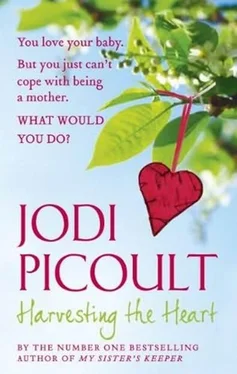Nicholas pulled his arm away from his mother’s touch. He knew he could not stand there much longer without giving in. He would reach for his mother, and by erasing the space between them, he would be wiping clean a slate listed with grievances that were already starting to fade. He took a deep breath and stood tall. “At one point you weren’t ready to be part of my familns Á€m, y.” He stepped back, digging his heel into the melting fossil sunset of one Moab print. “Well, I’m not ready now.” And he turned and disappeared through the shifting black curtain of the darkroom, leaving an outlined glow in the dim crimson light like the unrelenting face of a ghost.

“I went today.”
“I know.”
“How did you know?”
“You haven’t said three words to me since you got home. You’re a million miles from here.”
“Well, only about ten miles. Brookline’s not so far. But you’re just a Chicago girl; what could you know?”
“Very funny, Nicholas. So what did they say?”
“She. I wasn’t going to go when my father was home. I went during my lunch break today.”
“I didn’t know you got lunch breaks-”
“Paige, let’s not start this again.”
“So-what did she say?”
“I don’t remember. She wanted to know more. I left her a picture.”
“You didn’t talk to her? You didn’t sit down and have tea and crumpets and all that?”
“We’re not British.”
“You know what I mean.”
“No, we did not sit down and have tea. We didn’t sit down at all. I was there for ten minutes, tops.”
“Was it very hard?… Why are you looking at me like that? What?”
“How can you do it? You know, just cut to the heart of the matter like that?”
“Well, was it?”
“It was harder than putting together a heart-lung. It was harder than telling the parents of a three-year-old that their kid just died on the operating table. Paige, it was the hardest thing I’ve ever done in my life.”
“Oh, Nicholas.”
“Are you going to turn off that light?”
“Sure.”
“Paige? Do we have a copy of that picture I left at my parents’?”
“The one of Max we got with the sock snake?”
“Yeah. It’s a good picture.”
“I can get a copy. I have the negative somewhere.”
“I want it for my office.”
“You don’t have an office.”
“Then I’ll put it in my locker… Paige?”
“Mmm?”
“He’s a pretty attractive kid, isn’t he? I mean, on the average, I don’t think babies are quite as good-looking. Is that a pretentious thing to say?”
“Not if you’re his father.”
“But he’s handsome, isn’t he?”
“Nicholas, love, he looks exactly like you.”
Paige
I was reading an article about a woman who had a bad case of the postpartum blues. She swung from depression to exhilaration; she had trouble sleeping. She became slovenly, wild-eyed, and agitated. She began to have thoughts about hurting her baby girl. She called these thoughts The Plan and told them, in fragments, to her co-workers. Two weeks after she began having these ideas, she came home from work and smothered her eight-month-old daughter with a couch pillow.
She had not been the only one. There was a woman before her who killed her first two babies within days of their births and who tried to kill the third before authorities stepped in. Another woman drowned her two-month-old and told everyone he’d been kidnapped. A third shot her son. Another ran her baby over with her Toyota.
This apparently was a big legal battle in the United States. Women accused of infanticide in England during the first year after birth could be charged only with manslaughter, not murder. People said it was mental illness: eighty percent of all new mothers suffered from the baby blues; one in a thousand suffered from postpartum psychosis; three percent of those who suffered from psychosis would kill their own children.
I found myself gripping the magazine so tightly that the paper ripped. What if I was one of them?
I turned the page, glancing at Max in his playpen. He was gumming a plastic cube that was part of a toy too advanced for his age. No one ever sent us age-appropriate baby gifts. The next article was a self-help piece. Make a list, the article suggested, of all the things you can do. Supposedly after fashioning such a list, you’d feel better about yourself and your abilities than when you started. I flipped over the grocery list and picked up a dull pencil. I looked at Max. I can change a diaper. I wrote it down, and then the other obvious things: I can measure formula. I can snap Max’s outfits without scr al D‡ewing up. I can sing him to sleep. I began to wonder what talents I had that had nothing to do with my baby. Well, I could draw and sometimes see into people’s lives with a simple sketch. I could bake cinnamon buns from scratch. I knew all the words to “A Whiter Shade of Pale.” I could swim half a mile without getting too tired; at least I used to be able to do that. I could list the names of most of the cemeteries in Chicago; I knew how to splice electrical cords; I understood the difference between principal and interest payments on our mortgage. I could get to Logan Airport via the T. I could fry an egg and flip it in the pan without a spatula. I could make my husband laugh.
The doorbell rang. I stuffed the list into my pocket and tucked Max under my arm, especially unwilling to leave him alone after reading that piece on killer mothers. The familiar brown suit and cap of the UPS man was visible through the thin stained-glass pane of the door. “Hello,” I said. “It’s nice to see you again.”
The UPS man had come very other day since Nicholas mentioned to his mother that she had a grandson. Big boxes filled with Dr. Seuss books, Baby Dior clothing, even a wooden hobbyhorse, were sent in an effort to buy Max’s-and Nicholas’s-love. I liked my UPS man. He was young and he called me ma’am and he had soft brown eyes and a moony smile. Sometimes when Nicholas was on call he was the only adult I’d see for days. “Maybe you’d like to have some coffee,” I said. “It’s still pretty early.”
The UPS man grinned at me. “Thanks, ma‘am,” he said, “but I can’t, not on company time.”
“Oh,” I said, stepping back from the threshold. “I see.”
“It must be tough,” he said.
I blinked up at him. “Tough?”
“With a baby and all. My sister just had one and she used to be a teacher and she says one little monster is worse than a hundred and twenty seventh graders in springtime.”
“Well,” I said, “I suppose it is.”
The UPS man hoisted the box into our living room. “Need help opening it?”
“I can manage.” I shrugged and gave a small smile. “Thanks, though.”
He tipped his worn brown hat and disappeared through the open doorway. I listened to the squat truck chug down the block, and then I set Max on the floor next to the box. “Don’t go anywhere,” I said. I backed my way into the kitchen, and then I ran to get a knife. When I came into the living room again, Max had pushed himself up on his hands, like the Sphinx. “Hey,” I said, “that’s pretty good.” I flushed, pleased that I had finally seen a developmental marker before Nicholas.
Max watched as I cut the twine around the box and pulled out the staples. He caught a length of string in his fist and tried to work it into his mouth. I laid the knife beside the couch and pulled out of the box a little stool with cut-out yellow letters that spelled MAX and could be removed like a jigsaw puzzle. “Love, Grandma and Grandpa,” read the note. Somewhere1emÑ€ouc, Max had another grandpa and possibly another grandma. I wondered if he’d ever meet either.
Читать дальше













